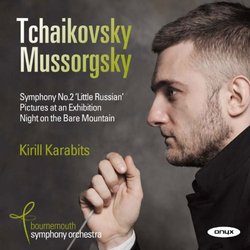| All Artists: Bournemouth Symphony, Kirill Karabits, Pyotr Ilyich Tchaikovsky Title: Tchaikovsky: Symphony No.2; Mussorgsky:Night on the Bare Mountain, Pictures at an Exhibition Members Wishing: 0 Total Copies: 0 Label: ONYX CLASSICS Release Date: 12/13/2011 Album Type: Import Genre: Classical Styles: Historical Periods, Romantic (c.1820-1910), Symphonies Number of Discs: 1 SwapaCD Credits: 1 UPC: 880040407423 |
Search - Bournemouth Symphony, Kirill Karabits, Pyotr Ilyich Tchaikovsky :: Tchaikovsky: Symphony No.2; Mussorgsky:Night on the Bare Mountain, Pictures at an Exhibition
 | Bournemouth Symphony, Kirill Karabits, Pyotr Ilyich Tchaikovsky Tchaikovsky: Symphony No.2; Mussorgsky:Night on the Bare Mountain, Pictures at an Exhibition Genre: Classical
Following on the success of their first release for Onyx, the Bournemouth Symphony Orchestra and Kirill Karabits turn to music from the Ukraine. The Little Russian, Tchaikovsky s most overtly nationalistic symphony, uses f... more » |
Larger Image |
CD Details
Synopsis
Product Description
Following on the success of their first release for Onyx, the Bournemouth Symphony Orchestra and Kirill Karabits turn to music from the Ukraine. The Little Russian, Tchaikovsky s most overtly nationalistic symphony, uses folk songs from the Ukraine and is the nearest the composer came to fulfilling the musical and cultural ideals proposed by The Mighty Handful. This group of composers Borodin, Balakirev, Rimsky-Korsakov, Cui and Mussorgsky rejected the Western influences on Russian culture and looked to the music, folklore and history of Mother Russia for inspiration. Mussorgsky composed A Night on the Bare Mountain in 1867. It is a striking work, quite shocking in its modernity. Inspired by paintings by his friend Victor Harmann, the suite Pictures at an Exhibition was originally written for piano in 1874 and was orchestrated by Maurice Ravel in 1922. It further displays Mussorgsky s supreme gift for graphic evocation.

 Track Listings (20) - Disc #1
Track Listings (20) - Disc #1